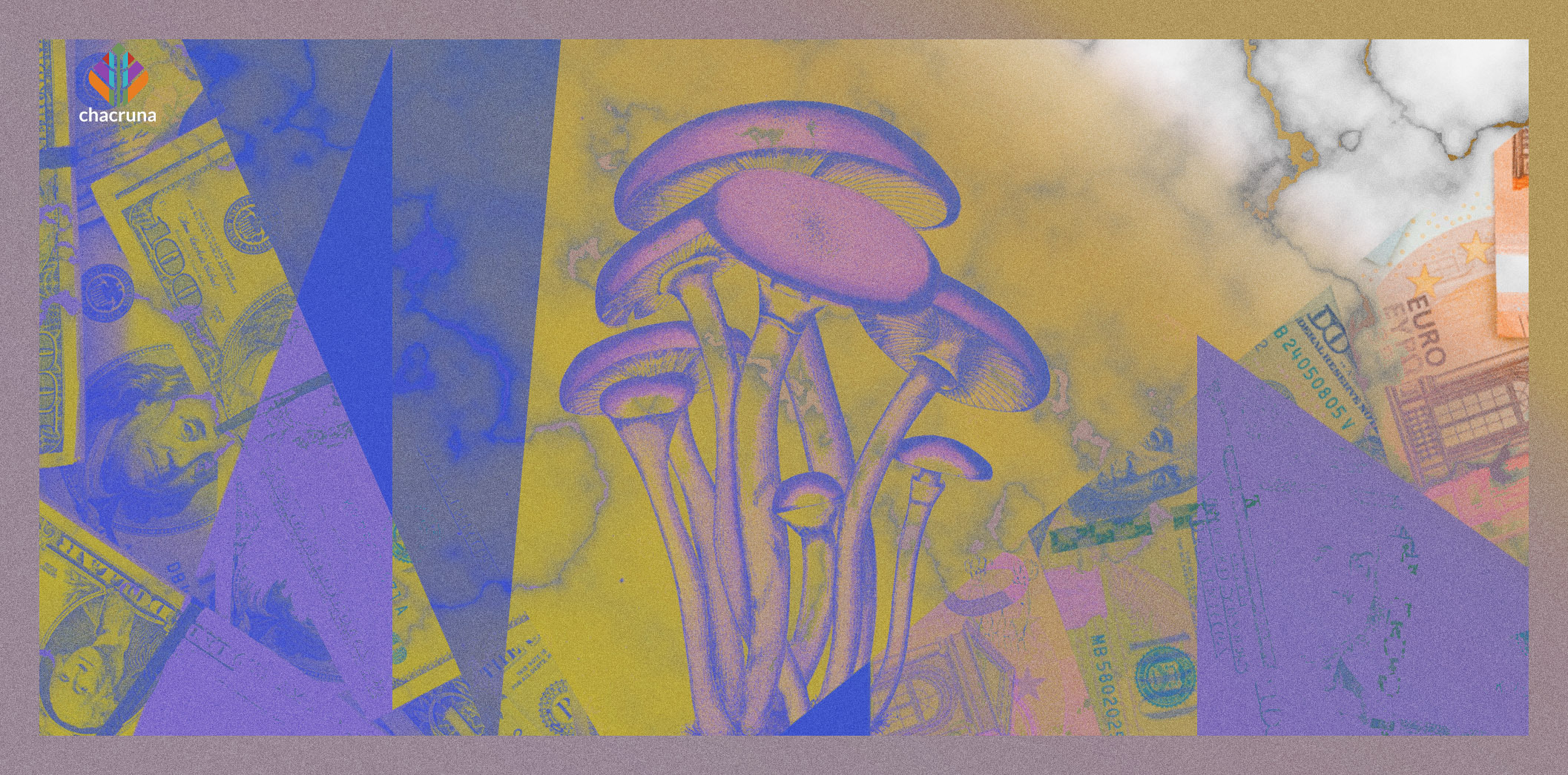- After 2024, the Scenario for Psychedelic Therapies Can Only Improve - January 16, 2025
- Symposium in Brazil Debates Psychedelics at a Political Crossroads - December 13, 2024
- Conference in Rio Defends Psychedelics in Public Health - December 11, 2024
The promise of revolutionary therapies for mental disorders has grown to the point of generating an excess of interest from the part of investors.
After President Richard Nixon declared the War on Drugs in 1971, clinical research on psychedelics remained stifled for three decades, amounting to a sure career-stopper in biomedical science for researchers. This state of affairs started to change with the advent of the twenty-first century and the renewed attention attracted by the so-called “psychedelic renaissance.” The promise of revolutionary therapies for mental disorders has grown to the point of generating an excess of interest from the part of investors. As a result, their rush to secure patent rights over age-old substances and healing practices now risks jeopardizing that very flurry of research.
Consider psilocybin, the psychoactive component of “magic mushrooms” (mainly ca. 200 species of the genus Psilocybe), some of which are traditionally used in ceremonies by peoples such as the Mazatecs in Mexico. According to the patent tracker maintained by Psilocybin alpha (a resource for analysis of the emergent psychedelic medicine sector), there exist 44 patents either granted or pending about psilocybin, 41 after the year 2000; another 24 applications have been filed since 2019. Similar figures refer to intellectual property (IP) concerning MDMA (53 patents granted, abandoned, or pending; 47 since 2000) and DMT (55, 53 since 2000).
Join us at Sacred Plants in the Americas II
The sheer number of IP rights claims, though, as well as the broad scope of privilege contained in some of them, have raised a lot of concern in the field.
Patents are intended to reward the investment made by innovators, giving them exclusivity in marketing their invention for 20 years. The sheer number of IP rights claims, though, as well as the broad scope of privilege contained in some of them, have raised a lot of concern in the field. The race is compared to an enclosure movement, where newcomers try to secure as big a piece of the now-accessible terrain as fast as they can, to the exclusion of those who have served as its stewards in the past, be it experienced shamans or stubborn pioneers, taking risks when almost nobody else would dare the exacting trip to uncharted domains.
The alarm sounded first in 2017, as the UK-based firm Compass Pathways filed three patent applications for the use of psilocybin against treatment-resistant depression. One of them was granted by the United States Patent Office (USPTO) on December 31, 2019, spurring a wave of protest based on the perception that such protection could prevent medical, traditional, or recreational uses of Psilocybe mushrooms by others. Such concerns have somewhat subsided since then, as it became clear that the patent covers only a specific crystalline form of synthetic psilocybin (COMP360), not the natural fungus itself.
Despite this, apprehension over the broad nature of granted or filed Compass patents and its purported impacts on research remains unabated. Actually, it has entered full-blown mode in the last weeks, thanks to author, podcaster and investor Tim Ferris. In a series of tweets, he issued the regroup call:
I am very concerned by the patent land grab warming up in the for-profit psychedelic world. Is anyone working on an IP Defense Fund—or coalition of pro-bono lawyers—of some type to file USPTO objections/comments, etc. when companies attempt to secure broad patents that could hinder scientific research, reasonable competition (i.e., for “scale” and wide accessibility, we need competition to help drive costs down), and so on? Who are the smartest people thinking about this?
Ferris is quite influential in psychedelic science circles, as the prescient investor who poured millions of dollars and helped raise the significant sums that gave birth to the Imperial College London Centre for Psychedelic Research and the Johns Hopkins Center for Psychedelic and Consciousness Research, as well as supported the Multidisciplinary Association for Psychedelic Studies (MAPS). It would sound silly to accuse him of being either anti-capitalism or naively putting shamans’ interests ahead of those who suffer from debilitating mental conditions, such as depression or post-traumatic stress disorder (PTSD) and could benefit of psychedelics as medicines. Nevertheless, those very accusations appear to lurk between the lines of a brash rebuttal he got from Christian Angermayer, an investor who has funded Compass and founded ATAI Life Sciences, a German biopharmaceutical company interested in psychedelics. He wrote that Ferriss was “incredibly misguided” on the topic:
Discover Indigenous Reciprocity Iniciative of the Americas
You’ve donated a few million dollars to the cause –that’s great and I applaud you for that, but it’s a drop in the ocean relative to what’s needed.
ATAI and Compass, two companies I have co-founded and co-financed, have raised close to $650,000,000 for this cause in the last few years alone while bringing the best minds and critical innovation to this challenge. If we include capital other companies in this field have raised, this adds up to more than $1bn.
This is the level of resource, talent and commitment required to finally change things and it’s made possible by having a viable business model.
If these companies succeed, hundreds of millions of people who are currently suffering stand to benefit, and because the drugs will likely be approved as medical drugs, there is a significant probability that insurance will cover it.
The exchange over Twitter developed into two open letters by Ferris and Angermayer. The long argument can be summarized as follows: a) According to Ferris, for-profit ventures have a critical role, but don’t get a free pass, as they face incentives to take unethical decisions in order to generate extra revenues, such as patenting “inventions” that aren’t inventions; b) Angermayer claims that IP and big business are key to expedite the access to novel drugs in general and psychedelics in particular, comparing the huge investment needed to getting a mortgage on a house otherwise not affordable to the average citizen: “For a certain period of time, society has to pay back the mortgage (assuming the house is great, and people want to move in), but after that society owns it and can live there rent-free.”
Angermayer’s case hinges on two coupled notions: first, that Compass is not patenting a natural product, but rather a specific form of crystallized psilocybin (polymorph A) produced in large batches following synthesis steps optimized by the company; and then, that it covers the use of the novelty in treating treatment-resistant depression. Challenges to Compass’ patenting attempts have been raised based on various rationales; for instance, that polymorph A is most probably present in both natural presentations of psilocybin and other synthesized forms of the compound; that Compass used synthesis information published years ago; and, last but not least, that the use of psilocybin as adjunct to psychotherapy for depression has already been tested in preliminary clinical trials, among others, by the Imperial College and Johns Hopkins (not to speak of healing practices among traditional peoples over centuries or millennia).
There is widespread concern that Compass’ incursions across the psychedelic commons will evolve into hurdles for the phase II clinical trial of psilocybin for depression sponsored by the Usona Institute, which obtained the same fast-track status of “breakthrough therapy” conferred to Compass by the FDA.
There is widespread concern that Compass’ incursions across the psychedelic commons will evolve into hurdles for the phase II clinical trial of psilocybin for depression sponsored by the Usona Institute, which obtained the same fast-track status of “breakthrough therapy” conferred to Compass by the FDA. Usona’s initiative, though, is based on an entirely different approach informed by the Open Science movement: The institute publishes all the steps to synthesize psilocybin, makes its own form of the drug available to other researchers interested in testing it, and does not seek patenting of processes or related therapies, relying, rather, on the five to six years of exclusive rights granted with FDA’s approval to use clinical trial data and to market the related therapy protocols.
Five or six years of exclusive rights, in face of two decades of privilege warranted by patents, may seem too little time for investors looking for huge return rates. To many of those who are no latecomers to the psychedelic battleground, on the other hand, it appears to be a much more equitable way of making the novel medicines available at more affordable prices. The most difficult argument to dispel, though, is the one claiming that not relying on patents will fail to generate the amount of capital necessary—hundreds of million dollars, as they say—to get a new drug to the market, therefore unnecessarily delaying the access to those in need.
Support the Eagle and the Condor’s Ayahuasca Religious Freedom Initiative
Not only greedy capitalists side with this viewpoint on the issue, but also respected researchers such as David Nutt from Imperial College, who told me, in a 2019 interview, that patents might be a price we have to pay to have the psychedelics regulated as soon as possible. It is the same with David Nichols, an emeritus at Purdue University and advisor to Compass who is listed as coauthor in the patent application. Nichols is quoted by Ann Harrison of Lucid News as saying that “There is such a huge need for new therapies for treating depression and addictions that it seems improbable to me that a not-for-profit strategy is sustainable. I applaud the Usona Institute’s efforts to bring this medication into global use, but personally I don’t see how workable it will be.”
In other words, there is a lot of money to be made in psychedelics, and of course, that is the reason why investors are so eager to secure IP rights on its applications.
One has to consider, though, that the potential market for treatments of mental disorders such as treatment-resistant depression is colossal, especially after all the grief and isolation imposed by the COVID-19 pandemic. Harrison reported in Lucid News that “Matthew Baggott, the former Director of Data Science and Engineering at Genentech and a researcher of psychedelic substances, believes that the market for all illnesses that psychedelic medicines could potentially treat is valued at more than $400 billion.” In other words, there is a lot of money to be made in psychedelics, and of course, that is the reason why investors are so eager to secure IP rights on its applications.
If Nichols sides with Compass, Usona’s strategy gets support from Rick Doblin, driving force behind MAPS, a non-profit he founded 35 years ago, when both Ferriss and Angermayer were still in primary school. It is quite telling that the psychedelic therapy closest to getting approval from the FDA—MDMA for post-traumatic stress disorder (PTSD)— results from the trail-blazing work done by Doblin and his MAPS associates, at great pains, not from some startup stuffed with cash after a successful IPO. The MDMA-PTSD phase III multicentric clinical trial under way is expected to publish promising results this year or next after being financed with millions raised from years and years of campaigns. It comes as no surprise then that Doblin has backed Ferriss and questioned Angermayer in a series of tweets:
“Christian [Angermayer] is not correct that patents are essential to obtain exclusive rights to market a medicine. … Data exclusivity is different than patents in that it doesn’t block other sponsors from generating all their own data to obtain approval to market the same drug for the same indication at the same time, if the other sponsors decide to spend the time and money,” he countered. “For MDMA-assisted therapy for PTSD, MAPS has already successfully completed one of our phase 3 studies, so we are many years and $50 million or so ahead of any other sponsors.” Doblin went further to state that “To the extent that ATAI and Compass seek to profit from blocking others through patents on processes or therapeutic processes that they didn’t invent, they will fail and they will squander their potential to be a force for healing and profit.”
Sign up to our Newsletter:
Activists in the psychedelic field have also protested about such claims. Bia Labate, Executive Director of the Chacruna Institute, notes, “Claiming that you need aggressive patenting techniques in order to treat millions of sick people around the globe would be like saying that you need a big chain like Starbucks to allow people to drink coffee. Let’s not forget that psilocybin grows naturally all over the world and can be harvested by anyone who can identify it. There are many alternative business models to be explored, such as locally owned and community driven initiatives.”
Besides Angermayer, Compass’ attempts at patenting were also defended in an article published on MAPS’ website by Ekaterina Malievskaia, the company’s Chief Medical Officer and co-founder, with partner George Goldsmith. After narrating how Compass Pathways came about distancing itself from previous collaboration agreements with the Heffter Research Institute and Usona Institute, she claimed:
Our patents do not preclude others from creating a range of different solutions for the synthesis and formulation of psilocybin; nor do they preclude the use of naturally occurring mushrooms, extracts, or any other products created by alternative synthesis and formulation routes. Equally, our patents do not prevent other clinicians from using our product or any psilocybin-containing products in conjunction with the types of therapy or psychological support they judge to be helpful, as long as it does not jeopardize patient safety. Lastly, neither our patents, regulatory strategy, nor pricing strategy have an impact on the practices of the underground community of practitioners in nonclinical settings.
One of the reasons lies in other patent applications filed by the company, such as WO2020212952, where Compass claims IP rights over a method of treating depression described in 162 clauses, including the administration of psilocybin in a room with a substantially non-clinical appearance, soft furniture, decoration with muted colors, a high-resolution sound system, and a bed or a couch.
Neither Malievskaia nor Angermayer have succeeded so far in convincing other actors in the psychedelic field that Compass has not put its commercial interests and revenue projections before public health benefits and research freedom. One of the reasons lies in other patent applications filed by the company, such as WO2020212952, where Compass claims IP rights over a method of treating depression described in 162 clauses, including the administration of psilocybin in a room with a substantially non-clinical appearance, soft furniture, decoration with muted colors, a high-resolution sound system, and a bed or a couch.
Anyone familiar with the protocols for psychedelic treatments and clinical research developed by legions of therapists since the 1960s, some at personal risk while working under the radar of law enforcement during prohibition times, can immediately recognize that there is no novelty there, if not a not-so-subtle intention to prevent others from competing with Compass. This why Doblin reacted by tweeting: “Attempts to patent therapeutic methods invented by others are doomed to fail, reputationally terrible, and capitalism gone rogue.”
Tim Ferriss, it seems, was right when he diplomatically penned that “even the purest of intentions can warp when they collide with the harsh realities of business.”
Disclaimer
Opinions and interpretations presented in this article are the author’s own, and do not necessarily coincide with Chacruna’s positions.
Art by Karina Alvarez.
Take a minute to browse our stock:
Did you enjoy reading this article?
Please support Chacruna's work by donating to us. We are an independent organization and we offer free education and advocacy for psychedelic plant medicines. We are a team of dedicated volunteers!
Can you help Chacruna advance cultural understanding around these substances?

















